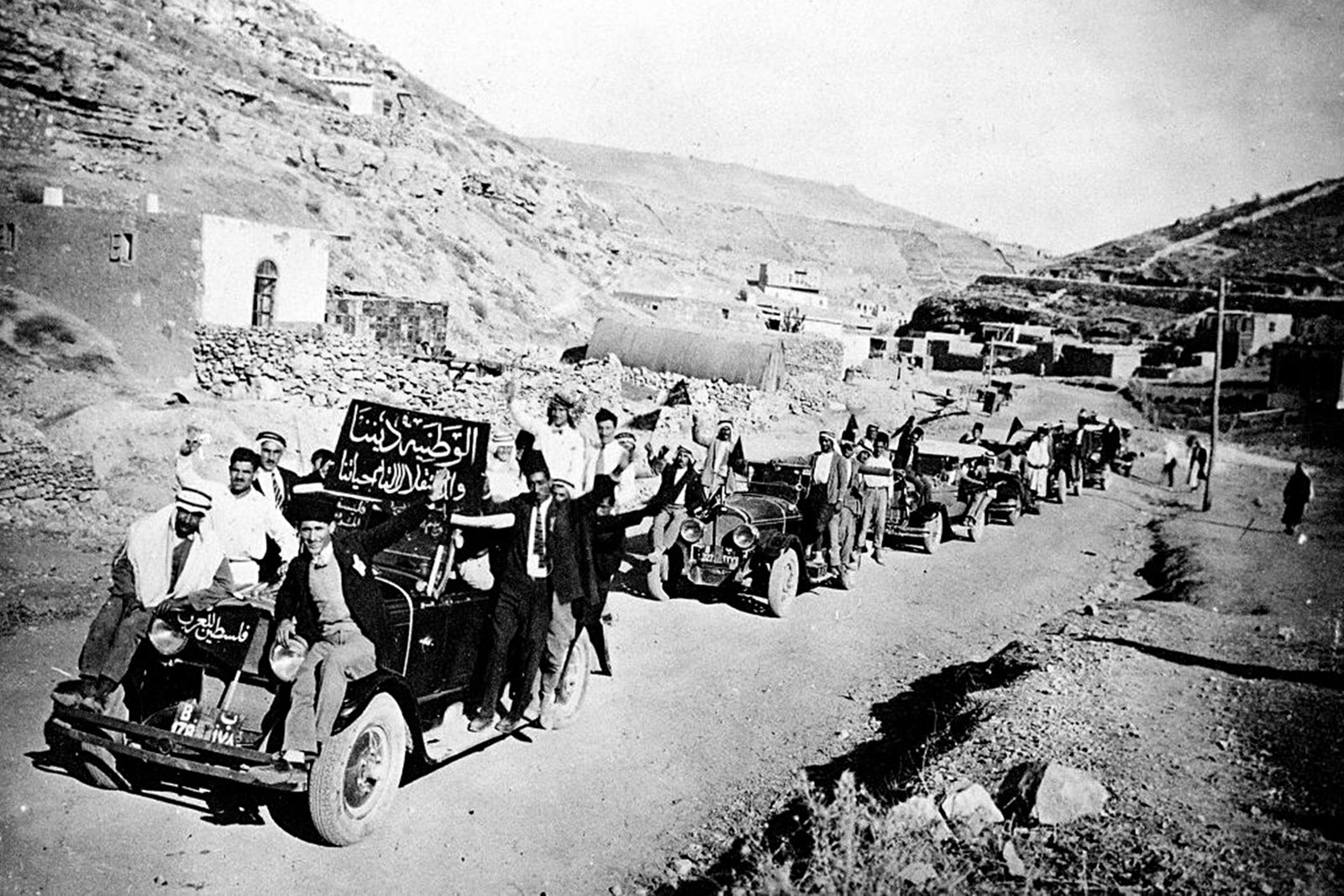On the day the Syrians forced Balfour to escape from Damascus, hiding 100 years ago policy

On the morning of April 1925, the British politician was Lord Arthur James Balfour To arrive early at the Haifa station, to join the traveler train to Syria, after he spent several noisy days in Palestine, where the Jews held concerts in which he has always received the phrase compliment that was deducted from the Psalms of the Old Testament, “Mubarak, next to the Lord.”
It was Damascus The third station is on a round of nearly two weeks, which Balfour started in Egypt, where the general met Edmond Alnabi And other officials, then continued his travel to Jerusalem To participate in the opening ceremony of the Hebrew University, which was invited to attend, and praises in a speech he made the efforts made by the Zionist movement to create a national homeland for the Jews.
A few hours before the start of the train, lightning wires began to be transmitted from the Syrian media, the Damascene determination to gather in front of a station Hijaz trainThe center of the capital, where it is scheduled to arrive in protest against an unwanted political visit, was known for his strong attachment to the teachings of the Torah, and his close association with Hayim Weizmann, one of the leaders of the Zionist movement, in addition to granting him the Jews (when he was Minister of Foreign Affairs 1916 – 1919) a right they did not possess in the southern part of natural Syria, historically famous for the Balfour Declaration.
Certainly, a politician, like Balfour, will remain in the eyes of the Syrians as a model for the colonial mentality that prevailed after the victory of the allies in the First World War, and translated by the San Remo Conference in 1920 by granting London and Paris to manage 3 Arab countries (Syria, Palestine, Iraq) under the assignment item claiming its residents needed to rehabilitate political and administrative, after it recently independent of Ottoman rule.
From the point of view of Michelle Provence, a professor of modern Middle East history at San Diego University, the Mandate engineers intended frankly the destruction of the Ottoman Empire, replacing it with what they considered easier in management, and more ideological comfort than a French -British imperial perspective.
The effects of the assignments and their structures are still present – according to his opinion – everywhere, and they have followed their impact, and he was dismayed from the way in which the international system was designed after the First World War to allow the worst types of atrocities and cover up on them.
In his book “The Genesis of the Modern Middle East”, he noted that the endeavors of the victorious powers – to colonize the lands of the defeated – required in part an implicit classification for the Ottoman Muslims, as non -European non -ethical groups, which required colonial guardianship over them, indicating that the negatives produced by the colonial system and the mandate system issued by the League of Nations still reveal in the region after 100 years.
Popular anger and security measures
Once Balfour’s visit was officially announced, the Syrians’ reactions escalated remarkably. Local newspapers reported the visit, the French High Commissioner, General Morris Sarai (the ruler of Syria, 1924-1925), received a telegram from the Syrian Representative Council- which includes representatives of the various Syrian regions- whose deposits asked to raise their protest against the fateful promise and its owner to the League of Nations in Geneva, in the hope that its positions will be fair, and for fairness Her rights are not right and fair.
He also distributed leaflets calling on the Syrians to show their sympathy with their Palestinian brothers, and to stand by them in the face of the challenges that their country is exposed to targeting its Arabism and heritage in its Islamic and Christian parts.
Field reports quoted the Damascene their desire to prevent and confront the visit from being completed, especially after the national leader Abd al -Rahman al -Shahndar held popular meetings in which the enthusiasm was pumped with the souls of the public and the intellectuals, and urged them to go out to the streets and protest, promising them that Balfour would not sleep one night inside the country.
This prompted General Saray to ask the government to take security measures in the capital, and send a secret police with officers and administrators to the Hama station on the Palestinian -Syrian border, to accompany the unwanted guest and maintain his security.
Change the visit program
It was scheduled – according to the plan prepared by the British High Commissioner in Palestine, Herbert Samuel with his French counterpart, General Saray in Syria – that the train, which is decreased by Balfour and the accompanying delegation at the Hijaz Train Station (in the center of the capital) and the reception of the guest, according to what is required by diplomatic norms.
But an unaccounted shock surprised Balfour, when the train crossed the Syrian border, as the people of the villages that passed through the signs of protests, black badges and chants confirm the Arabism of Palestine. Then the scene soon developed to throw stones at the vehicle in which it sits, which led to the destruction of its windows.
The popular confrontation of the procession was disturbed by the British authorities in Palestine, and according to press documents that covered that period – it disrupted urgent contacts with the French Mandate authorities in Syria to contain the situation, and set a joint plan to protect the guest during his arrival in Damascus, especially since information reached the Mandate Government in Jerusalem – announced later – stated that a plan was prepared to assassinate Balfour during his visit to the Syrian capital.
The researcher Abdel -Hadi Al -Bakkar states – in his book “Anonymous Pages from the History of Modern Syria” – that the French authorities’ sensitivity to the boiling situation that was applied in the streets of Damascus, and the intelligence information that I received in this regard prompted them to amend the Balfour Evening plan in order to preserve his life, so I decided to download it at the foot station in one of the southern suburbs of Damascus, instead of the Hijaz station in the city center. A car with the help of the British consul was prepared for a secret to the Victoria Hotel, its residence.
A consular document reserved at the British Foreign Archive says that the angry public remained besiege the Hijaz station, and most of it was law and medicine, after it was deluded by the presence of police personnel and its inspectors – along with the assistant representative of the High Commissioner and some of the British consulate employees – that Balfour is still on his way towards the station.
As for “Alf B” (the most prominent Syrian newspapers at the time), she monitored the moment the train arrived and his whistling was to the Hijaz station, saying, “The fans quickly embraced with their necks, and the policemen prevented people from entering the hall, and when the passengers came down, the news of the Lord descended at the foot station and his arrival at the Victoria Hotel, so the fans were spared towards the hotel, calling for the fall of the Balfour Declaration, and he cheered for Palestine.

The siege of the hotel
On the right bank of the Barada River (central Damascus), the famous Victoria Hotel, which was chosen as the headquarters of Lord Balfour, is like other important personalities. The hotel named the Queen of Britain, Alexandrina Victoria, after she decided to visit Damascus, as the local authorities named a number of prominent places in the capital in honor of it.
Although the royal visit was postponed because of the Queen’s illness and then her death, the hotel remained bearing her name until 1955, in which it was demolished and another building was constructed.
The Damascene Encyclopedia describes the Victoria Hotel, which was built between 1879-1890 as one of the most important historical and heritage buildings. It was characterized by a European style and a mixture of eastern architecture. It consisted of 3 floors, with a tiley hierarchical ceiling, and was equipped with the latest equipment available at that time.
During different periods – in addition to Balfour – the hotel received prominent personalities, some of whom were residing or holding meetings in its wings. Among them is Jamal Pasha, commander of the fourth Ottoman army, who took the headquarters of the First World War, and his successor Jamal Pasha (Al -Saghir). The British Army Commander in the Middle East also established in it.
One of the remarkable paradoxes is that the comfort that visitors enjoyed during their stay in it, because of his presence in a quiet area surrounded by orchards and green spaces along the eyes, did not feel Balfour, he remained a prisoner inside his room, anxiously following behind the curtains of its closed windows the anger of the Syrians and their demonstrations outside the walls. He often heard his chanting of his fall and his promise.
In its coverage of the hotel, the Palestinian newspaper, Palestine, based on a Reuters report from Damascus, explaining what was going on by saying, “A dangerous riot occurred, when the protesters managed to penetrate the scope that the police hit, and they were trying to reach the Victoria Hotel where Lord Balfour came down, and they almost arrived, but the police and the gendarmerie returned them backward, the last of which was shot in the air, and it came with African knights and 8 Armored browser to return the system to its quorum. ”
Balfour smuggling with a French cover
London continued the situation with great interest. Press telegrams were describing the protests as very worrying riots. The development of the events prompted the Daily News newspaper to light up to Lord Balfour to reassure his safety, and to inform him – according to Al -Shura Al -Qahiriya newspaper – the Solidarity of the entire England, which has become a full night, is worried about it.
During the next day confrontations, the French forces used the cavity and armored teams to disperse thousands of demonstrators in the streets and squares. Dozens of wounded fell, two of them were martyred. It seemed clear – in front of the crowds’ insistence on expelling the Balfour from the hotel – that things might go worse than that.
With the exacerbation of the situation, the French general, Sarai and the British Consul in Damascus, had a plan to smuggle the Balfour from the hotel away from the eyes of the demonstrators, the thousand BB newspaper revealed its details.
According to the newspaper, “the government ordered 3 hours before his travel, that Damascus would not enter or come out of a car until the road is completely empty.”
“The French High Commissioner, General Sarai, visited Lord Balfour at the hotel, and he stayed with him only a few minutes, and after an hour, General Saray returned and stood in his car on the bridge opposite the hotel, so the attention was turned to him, and his standing with the flight of French warplanes over the place, he was busy with her wore the audience, and thus the opportunity came to leave Balfour from the hotel from the back doors, Without anyone, and the British officer La Lacel was held by a car that took them to Beirut, under the guard of 12 secret policemen and 45 soldiers.
At a separate moment, Balfour left Syria carrying a picture that his men did not tell him, and he denied to the New York Times correspondent that he had any idea of potential problems he might face while he was in Syria, adding, “If I were warning in advance, I would have been canceled.”
However, an urgent question had to ask him before he left, “If people in Palestine did such a surprise, but to do these demonstrations, this is strange. What is a link between Syria and Palestine?”
In his book “A crossroads to Israel”, Christopher Sykes held the head of the thread, and continued, commenting, “Balfour, who expressed his annoyance with what happened, did not understand why Syria should be very interested in his historical declaration, and it is clear that he did not realize that the land that extends from the foot of the Mount Toraus to the edge of the Sinai desert is one country physically, ethnically, emotionally and economically, although it was divided because of the requirements World.




